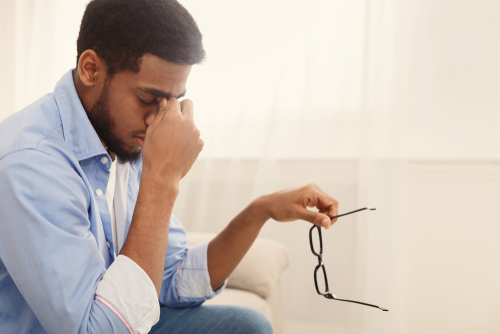Who Is At Risk For Glaucoma?

Glaucoma is one of the more frightening eye diseases you can have. Because it is hard to detect and causes vision loss, its nickname is the silent thief of sight.
The most common form of glaucoma is incurable and can rob you of your sight forever. Glaucoma is also very difficult to detect. It has no other symptoms besides permanent vision loss.
However, you can slow down the progression of glaucoma. If you detect it early enough, you may be able to keep your eyesight.
Keep reading to learn more about glaucoma and who is most at risk of developing it.
What is Glaucoma, and How Do You Treat it?
Glaucoma is damage to your optic nerve caused by internal eye pressure. Pressure most commonly builds in your eyes due to a blockage in the drainage meshwork inside your eye.
This blockage prevents fluids from draining out of your eye as fast as they flow into your eye. As the pressure increases, it damages your optic nerve. Gradual vision loss like this is due to primary open-angle glaucoma.
There is also a rarer form of glaucoma, called angle-closure glaucoma. It causes a rapid increase in eye pressure and sudden vision loss.
Headaches and nausea are also symptoms of angle-closure glaucoma. It is a medical emergency. If you suddenly lose vision like this, seek immediate attention. Timely treatment can save your eyesight.
Can You Prevent Glaucoma?
There are no guaranteed ways to prevent glaucoma. But, you can lower your chances of developing it with simple lifestyle adjustments.
The simplest ways to reduce your risk of glaucoma are:
- Maintain a healthy weight
- Maintain healthy blood pressure levels
- Eat a healthy diet
- Keep other medical conditions under control
There is no sure way to prevent glaucoma or the vision loss it can cause. But you can limit the damage it does to your eyesight.
To limit the damage, make sure to have regular eye exams with your eye doctor. If a doctor can diagnose glaucoma in its early stages, they can treat it.
Early treatment means you can manage your glaucoma and slow down its progression. To determine if you have glaucoma, your eye doctor will look at your current eye health.
They will also check if you are in one of the following glaucoma risk factor categories.
Glaucoma Risk Factors
- Over 60 years old
- African American, Asian, Hispanic, Japanese, Russian, Irish, Scandinavian, or Inuit ancestry
- Family history of glaucoma
- Thin corneas
- Extreme refractive error
- Previous eye injury
- Prolonged corticosteroid use
- Other conditions such as diabetes and heart disease
- High intraocular eye pressure
Glaucoma Treatments
You can save your vision with medication if you detect glaucoma early. The most common glaucoma medications are eye drops. Oral medications are also available if you can’t take eye drops.
Glaucoma medications moderate internal eye pressure. They do this by either relaxing the muscles in the eye or reducing the amount of eye fluid produced.
Some medications will do both. Your eye doctor will determine the best medicine for you.
You must take your glaucoma medication regularly for it to work. As soon as you stop, your internal eye pressure will rise, and your vision will start to become damaged again.
Some patients need emergency surgery to reduce internal eye pressure rapidly. But even if you have surgery, medication will still be necessary to control the disease.
Schedule an appointment at Kovach Eye Institute in Elmhurst, IL, to ensure you do not have glaucoma. Don’t risk your eyesight for another day!

